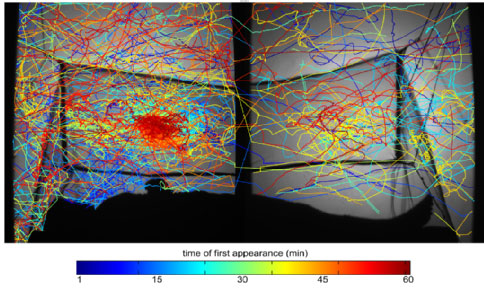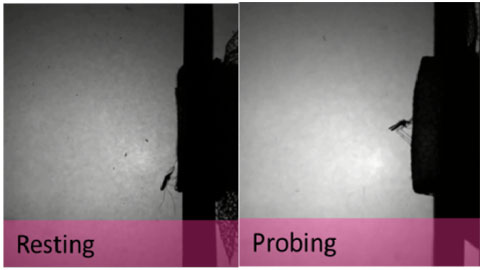The U.K.’s Liverpool School of Tropical Medicine’s (LSTM) Department of Vector Biology received a $2 million grant from the Bill & Melinda Gates Foundation for a research program to establish test protocols for development of vector control products, according to the University of Warwick in Coventry, England, which also is involved in the research.
The methods used to evaluate the performance of new products and their impact of insecticide resistance are limited to “basic laboratory tests,” the University of Warwick says in a news release, which is why the new research aims to test effectiveness of the mosquito control products in the field.

An infra-red tracking system shows the flight paths of multiple mosquitoes as they attempt to reach a sleeping human protected inside an insecticide-treated bed net. The image shows the high concentration of activity on the roof of the net, above the torso of the sleeper beneath.
Photo: University of Warwick
The research team, led by LSTM professors Philip McCall and Hilary Ranson, aims to develop a more robust and biologically relevant approach to mosquito control that will define how a specific product is likely to function. A group from the University of Warwick School of Engineering led by professor David Towers also is collaborating on the research.
“The team aims to develop experimental procedures to record the impact of exposure to an active ingredient or formulated product over the lifetime of the mosquito,” McCall says in the news release. “At the end of the three-year project, tests will be assembled into a defined pipeline for optimizing impact assessment of potential new vector control products under laboratory controlled conditions and we will produce an updated manual for the laboratory analysis of vector control products for consideration by who.”

The team developed camera systems that allow observation and quantification of detailed aspects of a mosquito’s behavior. Behavior is recorded as it starts to feed on a human through an insecticide-treated bed net.
Photo: University of Warwick
The Accelerating time to market of new vector control tools by strengthening the Phase I evaluation grant is will support the application of video-tracking methods to quantify the effects of any chemical or device on mosquito behavior. The universities say a the products will be evaluated by “exploring a range of potential additional delayed or sub-lethal effects that could eventually impact malaria transmission.”
“We hope the use of video-tracking and associated data analytics combined with the significant expertise at LSTM will lead to better understanding of vector control approaches and hence significantly improved products to combat the spread of malaria throughout Africa,” Towers says.
The project is founded on technological advances the team developed during their previous collaboration on the European Union-funded Avecnet Consortium for African vector control, ongoing research funded by the Medical Research Council, and a new Wellcome Trust-funded collaboration on Malaria in Insecticide Resistant Africa (MIRA).
Leave A Comment